新版新目标七上Unit5词汇详细用法
(部编版)2020年七年级英语上册Unit5Doyouhaveasoccerball讲义(新版)人教新目标版
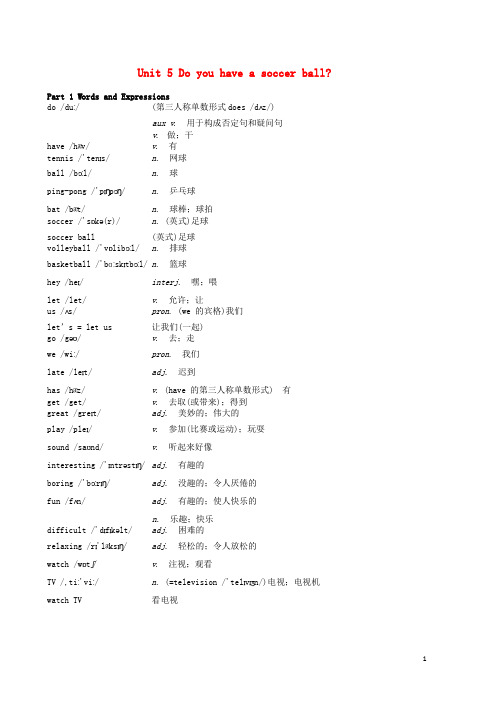
Unit 5 Do you have a soccer ball?Part 1 Words and Expressionsdo /duː/ (第三人称单数形式does /dʌz/)aux v. 用于构成否定句和疑问句v. 做;干have /hæv/ v. 有tennis /'tenɪs/ n. 网球ball /bɔːl/ n. 球ping-pong /'pɪŋpɔŋ/ n. 乒乓球bat /bæt/ n. 球棒;球拍soccer /'sɒkə(r)/ n. (英式)足球soccer ball (英式)足球volleyball /'vɒlibɔːl/ n. 排球basketball /'bɑːskɪtbɔːl/ n. 篮球hey /heɪ/ interj. 嘿;喂let /let/ v. 允许;让us /ʌs/ pron. (we 的宾格)我们let’s = let us 让我们(一起)go /gəʊ/ v. 去;走we /wiː/ pron. 我们late /leɪt/ adj. 迟到has /hæz/ v. (have 的第三人称单数形式) 有get /get/ v. 去取(或带来);得到great /greɪt/ adj. 美妙的;伟大的play /pleɪ/ v. 参加(比赛或运动);玩耍sound /saʊnd/ v. 听起来好像interesting /'ɪntrəstɪŋ/ adj. 有趣的boring /'bɔːrɪŋ/ adj. 没趣的;令人厌倦的fun /fʌn/ adj. 有趣的;使人快乐的n. 乐趣;快乐difficult /'dɪfɪkəlt/ adj. 困难的relaxing /rɪ'læksɪŋ/ adj. 轻松的;令人放松的watch /wɒtʃ/ v. 注视;观看TV /,tiː'viː/ n. (=television /'telɪvɪʒn/)电视;电视机watch TV 看电视same /seɪm/ adj. 相同的love /lʌv/ v. & n. 爱;喜爱with /wɪð/ prep. 和……在一起;带有;使用sport /spɔː(r)t/ n. 体育运动them /ðəm/ pron. (they 的宾格) 他(她、它)们only /'əʊnli/ adv. 只;仅like /laɪk/ v. 喜欢;喜爱easy /'iːzi/ adj. 容易的;不费力的after /'ɑːftə(r)/ prep. & conj. 在……之后class /klɑːs/ n. 班级;课classmate /'klɑːsmeɪt/ n. 同班同学Bill /bɪl/ 比尔(男名)Part 2:Texts课文(一)Cindy: Hey, Helen, let’s go! We’re late!Helen: OK.Cindy: Do you have the baseball?Helen: Yes, I do. It’s in my bag.Cindy: And where’s our baseballbat? Helen: Bill has it.Cindy: Oh, yeah. And do you have your jacket?Helen: Oh, no, I don’t. It’s on the chair. Letme get it. Cindy: And your hat, too!Helen: OK, I have my jacket and hat. Let’s go!Structure1. Do you have a baseball?Yes, I do./No, I don’t. I have a volleyball.2. Do you have a ping-pong bat?Yes, I do./No, I don’t. I have a ping-pong ball.3. Does she have a tennis ball?Yes, she does./No, she doesn’t. She has a baseball.4. Does he have a soccer ball?Yes, he does./No. he doesn’t. He has two ping-pong bats.5. Do they have a basketball?Yes, they do./No, they don’t. They have a volleyball.don’t = do not doesn’t = does not句型:—Do/Does sb. have…?—Yes, sb. do / does.—No, sb. don’t / doesn’t.Write each word in the correct place in the chart.将方框中的单词填入表格中正确的位置。
新目标七上Unit 5 Do you have a soccer ball?词汇点睛

Unit 5 Do you have a soccer ball?词汇点睛(第三人称单数形式does)用于构成否定句和疑问句;做;干有网球球乒乓球棒球;球拍(英式)足球排球篮球嘿;喂允许;让(we的宾格)我们让我们(一起)去;走我们迟到(have的第三人称单数形式)有去取(或带来);得到美妙的;伟大的参加(比赛或运动);玩耍听起来好像有趣的没趣的;令人厌倦的有趣的;使人快乐的n乐趣;快乐困难的轻松的;令人放松的注视;观看电视;电视机看电视相同的爱;喜爱和在一起;带有;使用体育运动(they的宾格)他(她、它)们只;仅喜欢;喜爱容易的;不费力气的在以后班级;课同班同学比尔(男名)1. do/does1)作助动词,帮助构成一般现在时的否定句或疑问句,无意义。
Do you have a soccer ball? 你有足球吗?I don’t know. 我不知道。
Does Jim have a sister? 吉姆有妹妹吗?What does he like? 他喜欢什么?He doesn’t like English. 他不喜欢英语。
2) 作实义动词,“做,干”。
I do my homework ever y day. 我每天都做家庭作业。
Bob does his homework every day. 鲍勃每天都做家庭作业。
3) 在一般现在时中,do/does 可用来替代上文出现过的动词,以避免重复。
Do you have a soccer ball? 你有足球吗?Yes, I do. 是的,我有。
(do 代have)Does she have an eraser? Yes, she does.I don’t have a soccer ball, but my brother Alan does.我没有足球,但我的哥哥艾伦有。
2. play + 球类名词:打/踢……球(注意:球类运动不用冠词)play ping-pong/basketball/volleyball/tennis/soccer3. sound1)连系动词,“听起来”,后接形容词作表语。
人教新目标英语七年级上册Unit-5--6重难点总结+练习题(无答案)
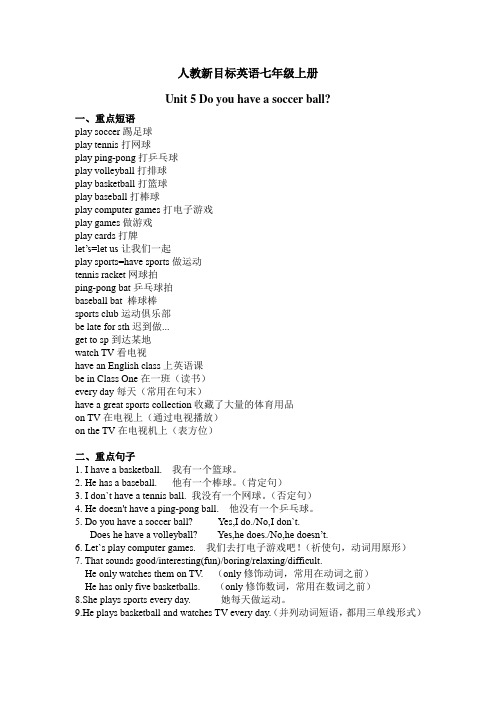
人教新目标英语七年级上册Unit 5 Do you have a soccer ball?一、重点短语play soccer踢足球play tennis打网球play ping-pong打乒乓球play volleyball打排球play basketball打篮球play baseball打棒球play computer games打电子游戏play games做游戏play cards打牌let’s=let us让我们一起play sports=have sports做运动tennis racket网球拍ping-pong bat乒乓球拍baseball bat 棒球棒sports club运动俱乐部be late for sth迟到做...get to sp到达某地watch TV看电视have an English class上英语课be in Class One在一班(读书)every day每天(常用在句末)have a great sports collection收藏了大量的体育用品on TV在电视上(通过电视播放)on the TV在电视机上(表方位)二、重点句子1. I have a basketball. 我有一个篮球。
2. He has a baseball. 他有一个棒球。
(肯定句)3. I don`t have a tennis ball. 我没有一个网球。
(否定句)4. He doesn't have a ping-pong ball. 他没有一个乒乓球。
5. Do you have a soccer ball? Yes,I do./No,I don`t.Does he have a volleyball? Yes,he does./No,he doesn’t.6. Let`s play computer games. 我们去打电子游戏吧!(祈使句,动词用原形)7. That sounds good/interesting(fun)/boring/relaxing/difficult.He only watches them on TV. (only修饰动词,常用在动词之前)He has only five basketballs. (only修饰数词,常用在数词之前)8.She plays sports every day. 她每天做运动。
七年级英语上册unit5知识点归纳
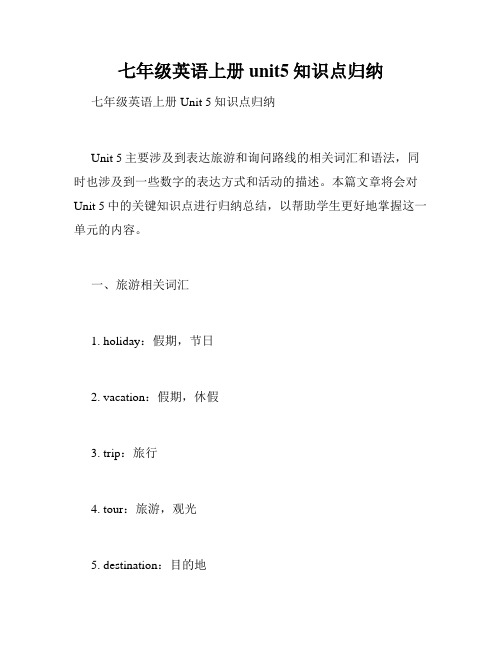
七年级英语上册unit5知识点归纳七年级英语上册Unit 5知识点归纳Unit 5主要涉及到表达旅游和询问路线的相关词汇和语法,同时也涉及到一些数字的表达方式和活动的描述。
本篇文章将会对Unit 5中的关键知识点进行归纳总结,以帮助学生更好地掌握这一单元的内容。
一、旅游相关词汇1. holiday:假期,节日2. vacation:假期,休假3. trip:旅行4. tour:旅游,观光5. destination:目的地6. attraction:景点7. guide:导游8. sightseeing:观光9. souvenir:纪念品二、询问路线相关词汇1. Excuse me:对不起2. Where is…?:…在哪里?3. Can you tell me…?:你能告诉我…?4. How do I get to…?:我怎么到…?5. Turn left/right:向左/右转6. Go straight:直走7. It’s on your left/right:它在你的左边/右边8. Take the…:乘坐…9. Bus stop:公交车站10. Subway station:地铁站三、数字的表达方式1. Numbers 1-10:one, two, three, four, five, six, seven, eight, nine, ten2. Numbers 11-20:eleven, twelve, thirteen, fourteen, fifteen, sixteen, seventeen, eighteen, nineteen, twenty3. Tens:thirty, forty, fifty, sixty, seventy, eighty, ninety4. Hundred:一百5. Thousand:一千6. Million:一百万四、活动的描述1. Have a good time:玩得愉快2. Go shopping:去购物3. Go sightseeing:去观光4. Go swimming:去游泳5. Go hiking:去远足6. Go camping:去露营7. Have a picnic:野餐以上为Unit 5的关键知识点归纳总结,希望能够对学生们更好地掌握这一单元的内容提供帮助。
新目标七年级英语上册Unit5重点词汇讲解

1. be made of&be made frombe made of和be made from都表示“由……制成”,但二者用法有所区别。
◆当原材料制成成品后,仍保持原有性质时,常用be made of。
如:Sara’s schoolbag is made of cloth.◆当原材料制成成品后,失去了原有的性质时(即经过加工,已不是原来的样子),常用be made from。
如:This kind of paper is made from wood and bamboo.【注意】在语料库(COCA)中也可以检索出一些二者通用的例子。
如:Their clothing was at first made of cotton.... a sweater made from cotton that grows in different colors.【拓展】◆ be made in表示“在……制造”,后接表示地点或时间的词语。
如:The washing machine was made in Qingdao.The car was made in 2012.◆ be made by表示“由……制造”,后接动作的执行者。
如:Was the model plane made by your brother?◆ be made into表示“(原材料)被制成……”。
如:Glass can be made into bottles.【运用】用恰当的介词填空。
(1) —What are your shoes made ____________?—Leather (皮革).(2) His watch was made ____________ Shanghai.(3) The machines were made ____________ many workers.(4) The wood will be made ____________ desks and chairs for students.(5) This kind of wine is made ____________ grapes.2. be known / famous forbe known / famous for 意为“以……闻名;为人知晓”。
人教新目标英语七年级上册 Unit5 知识点归纳总结
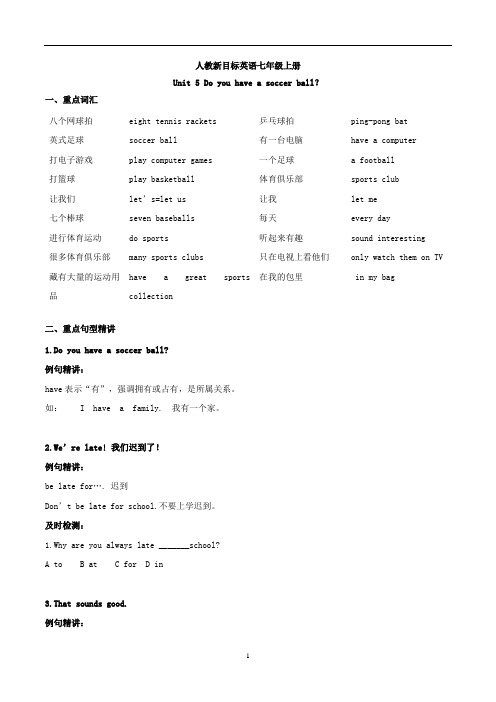
人教新目标英语七年级上册Unit 5 Do you have a soccer ball?一、重点词汇八个网球拍eight tennis rackets 乒乓球拍ping-pong bat英式足球soccer ball 有一台电脑have a computer打电子游戏play computer games 一个足球 a football打篮球play basketball 体育俱乐部sports club让我们let’s=let us 让我let me七个棒球seven baseballs 每天every day进行体育运动do sports 听起来有趣sound interesting很多体育俱乐部many sports clubs 只在电视上看他们only watch them on TV藏有大量的运动用品have a great sportscollection在我的包里 in my bag二、重点句型精讲1.Do you have a soccer ball?例句精讲:have表示“有”,强调拥有或占有,是所属关系。
如:I have a family. 我有一个家。
2.We’re late! 我们迟到了!例句精讲:be late for…. 迟到Don’t be late for school.不要上学迟到。
及时检测:1.Why are you always late _______school?A toB atC forD in3.That sounds good.例句精讲:1)连系动词,“听起来”,后接形容词作表语。
That story sounds very interesting.那故事听起来很有趣。
2)名词“声音”(泛指自然界中的各种声音)。
The sound is too loud.声音太大了。
及时检测:1.翻译:我们一起去打篮球吧!听起来不错啊!2.The _______makes me annoyed.A soundB noiseC voice4.We play it at school with our friends.我们和我们的朋友在学校踢。
七年级上册英语unit 5知识点
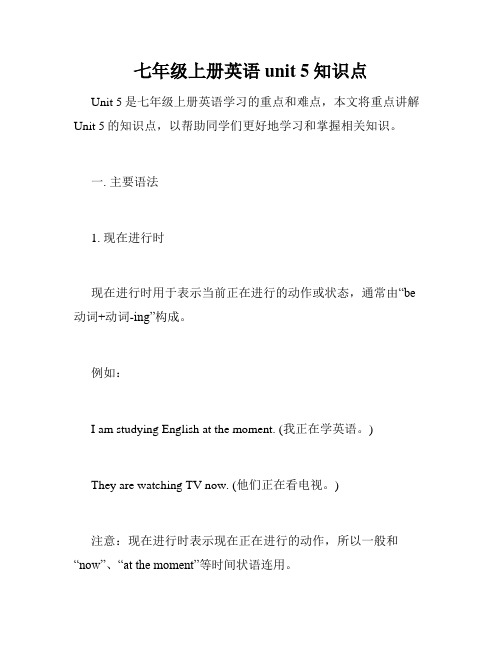
七年级上册英语unit 5知识点Unit 5是七年级上册英语学习的重点和难点,本文将重点讲解Unit 5的知识点,以帮助同学们更好地学习和掌握相关知识。
一. 主要语法1. 现在进行时现在进行时用于表示当前正在进行的动作或状态,通常由“be 动词+动词-ing”构成。
例如:I am studying English at the moment. (我正在学英语。
)They are watching TV now. (他们正在看电视。
)注意:现在进行时表示现在正在进行的动作,所以一般和“now”、“at the moment”等时间状语连用。
2. 一般现在时一般现在时用于表示经常性或习惯性的动作,通常由动词原形构成。
例如:I usually get up at 6 o'clock. (我通常6点起床。
)She likes playing basketball. (她喜欢打篮球。
)注意:一般现在时表示的是普遍真理、习惯性的动作或状态,所以一般不与特定的时间状语连用。
二. 名词复数形式在Unit 5中,我们需要掌握一些常见名词的复数形式,如下表所示:单数形式复数形式bus buseswatch watchesbox boxestomato tomatoeshero heroesgift gifts特别注意:有些名词的复数形式不规则,需要特别记忆。
例如:child – childrenman – menwoman – women三. 数字表达数字在生活中非常常见,因此在学习英语过程中也需要掌握数字的读法和写法。
1. 数字的读法阿拉伯数字英文数字0 zero1 one2 two3 three4 four5 five6 six7 seven8 eight9 nine10 ten2. 时间表达时间在日常生活中非常重要,因此我们也需要掌握表达时间的基本方法。
例如:11:45 – It's a quarter to twelve. (离12点还有15分钟。
2019秋七年级英语上册 Unit 5 Do you have a soccer ball早读手册素材 (新版)人教新目标版
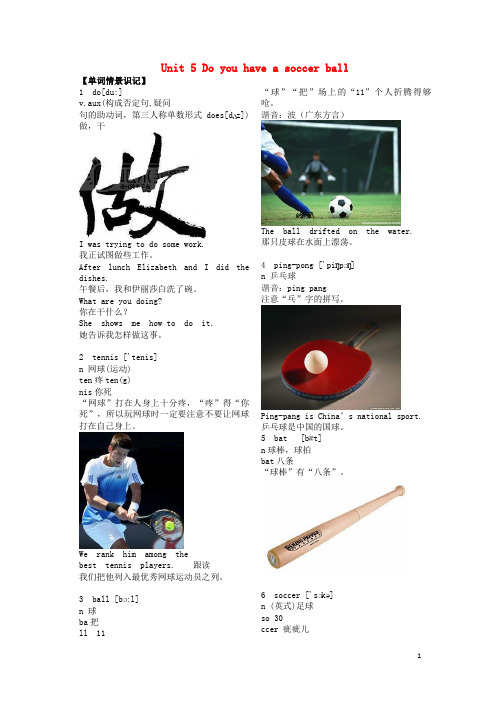
Unit 5 Do you have a soccer ball 【单词情景识记】1 do[du:]v.aux(构成否定句,疑问句的助动词,第三人称单数形式does[dʌz])做,干I was trying to do some work.我正试图做些工作。
After lunch Elizabeth and I did the dishes.午餐后,我和伊丽莎白洗了碗。
What are you doing?你在干什么?She shows me how to do it.她告诉我怎样做这事。
2 tennis ['tenis]n 网球(运动)ten疼ten(g)nis你死“网球”打在人身上十分疼,“疼”得“你死”,所以玩网球时一定要注意不要让网球打在自己身上。
We rank him among thebest tennis players. 跟读我们把他列入最优秀网球运动员之列。
3 ball [bɔ:l]n 球ba把ll 11 “球”“把”场上的“11”个人折腾得够呛。
谐音:波(广东方言)The ball drifted on the water.那只皮球在水面上漂荡。
4 ping-pong ['piŋpɔŋ]n 乒乓球谐音:ping pang注意“乓”字的拼写。
Ping-pang is China’s national sport.乒乓球是中国的国球。
5 bat [bæt]n球棒,球拍bat八条“球棒”有“八条”。
6 soccer ['sɔkə]n (英式)足球so 30ccer 疵疵儿“(英式)足球”是由“30”个“疵疵儿”踢的。
它和美式足球不一样。
It must be one of those soccer scarfs fromEngland.那一定是某个英国足球队的围巾。
7 soccer ball(英式)足球Last summer, two teams of four players eachbattled for control of a small, red and white soccerball in Washi ngton, D.C.去年夏天,有两支四人制的足球队在华盛顿特区进行比赛,他们所踢的足球是一种很小的红色和白色相间的球。
英语新目标七上Unit 5笔记

Unit 5 Do you have a soccer ball?1. 有实义动词的陈述句,一般疑问句及特殊疑问句。
陈述句肯定句:主语(第一人称、第二人称、第三人称复数)+v.(原形)或者主语(第三人称单数)+v.(单三)陈述句否定句:主语(第一人称、第二人称、第三人称复数)+don’t + v.(原形)或者主语(第三人称单数)+ doesn’t + v.(原形)一般疑问句:Do+ :主语(第一人称、第二人称、第三人称复数)+v.(原形)+…?回答:Y es, 主语人称代词+ do. No, 主语人称代词+ don’t.或者Does + 主语(第三人称单数)+ v.(原形) + …?回答:Y es, 主语人称代词+ does. No, 主语人称代词+ doesn’t.特殊疑问句由特殊疑问词+ 一般疑问句构成。
2. 动词变单三参照名词变复数变化已学动词展示:answer—answers; look—looks; spell—spells; call—calls; watch—watches; know—knows; take—takes; bring—brings; need—needs; have—has; play—plays; sound—sounds; like—likes.3. Let’s do sth. (do为所给动词的原形)That/ It sounds + adj.(七个形容词interesting, fun, boring, difficult, relaxing, good, great,.)4. but/ and/ or 用法and 表句子之间的并列关系。
eg: I’m a student, and I’m in Class Eleven.but表句子之间的转折关系。
eg: He has a volleyball, but he doesn’t have a tennis.Or表选择关系。
新目标七年级英语上册Unit 5 单元归纳

Unit 5单元归纳一、短语归纳1.play tennis ball 打网球2. ping-pong bat 乒乓球拍3. play ping-pong ball 打乒乓球4. soccer ball (英式)足球5. a tennis bat 一个网球拍6.play basketball 打篮球7. baseball bat 棒球棒8.love sports 喜爱运动9. watch TV 看电视10. be late 迟到11. after class 课后12 . at school 在学校13. Let’s go 我们走吧14. go to school 去上学15. in the same school 在同一所学校16. play computer games 玩电子游戏17.watch sports on TV 在/ 通过电视上看运动18. go to the same school 去同一所学校19 . with my classmates 和我的同学们在一起二、用法集萃1.—Do you / they have ……你/ 你们有……吗?—Yes , I / they do . 是我/ 他们有……—No , I / they don’t 不,我/ 他们没有。
2. —Does he / she have ……?他/ 她有……吗?—Yes , he / she does 是,他/ 她有。
—No , he / she doesn’t不,他/ 她没有。
3.Let sb do sth 让某人做某事4. Let sb not do sth 让某人不做某事5. Let’s do sth 让我们做某事吧6. That sounds + 形容词:那听起来……7. It’s easy for sb 它对某人来说是容易的。
8. with sb 和某人在一起9. play sth with sb 和某人一起玩某物10. go to + 地点:去某地……11. love to do sth 喜爱做某事(喜爱做特定的或某件具体的事情,指一时的喜好)12. love doing sth 喜爱做某事(着重指习惯) 13. like sb /sth 喜欢某人或某物14. like to do sth 喜欢做某事(喜欢做特定的或某件具体的事情,指一时的喜好)15. like doing sth 喜欢做某事(着重指习惯)16. It is + 形容词 for sb :对某人来说……17. It is + 形容词 for sb to do sth 做某事对某来说……三、同义词1. play sports = have sports = do sports 做运动;参加体育运动2. interesting = fun 有趣的3. boring = not interesting 没趣的4. difficult = not easy 困难的5. easy = not difficult 容易的6. have fun = have a good / nice time 玩得高兴7. love = like 爱,喜爱,喜欢四、知识要点(一)Section A 1a 知识要点1. Do you have a ping-pong bat ? 你有一个乒乓球吗?析:这是一个一般现在时的一般疑问句,句中的谓语动词have 是一个实义动词。
七年级上册unit5知识点总结

七年级上册unit5知识点总结本篇文章总结了七年级上册英语第五单元的重点知识,包括词汇、语法、听力和口语练习等方面。
希望对学生们巩固知识、提高水平有所帮助。
一、词汇1. 颜色:red, blue, green, yellow, purple, black, white, orange, brown, pink2. 衣服:shirt, T-shirt, skirt, pants, dress, hat, socks, shoes, coat, sweater3. 学科:math, English, geography, biology, history, art, music, PE4. 人物:teacher, student, father, mother, sister, brother, friend, family, cousin, grandparents二、语法1. be动词用法(am, is, are):用于描述人或事物的状态,第一人称用am,第二和第三人称用is和are,例如:I am a student. He is my teacher. They are my classmates.2. have的用法:用于表示拥有某物或进行行为,例如:I have a book. She has a pencil. They have lunch at 12 o'clock.3. There be句型:用于描述某个地方或场所有什么事物,例如:There is a park near my house. There are many trees in the park.4. 名词所有格:表示某物是谁的,例如:My father's car. The students' books.三、听力和口语练习1. 听力训练:通过听音频或录音练习听力,学生们可以提高对于口语、听力的敏感度,从而更好地进行口语练习和交流。
七上英语五单元知识点

七上英语五单元知识点【重点短语】1. have a basketball 有一个篮球2. play basketball 打篮球3. have a badminton 有一个羽毛球4. play badminton 打羽毛球5. with our family 和我们的家人一起6. have a tennis racket 有一个网球拍7. play tennis 打网球8. at home 在家9. play sports 做运动10. play computer games 玩电脑游戏11. watch TV 看电视12. in the same school 在同一所学校13. after class 下课后14. go to school 去上学15. at the library 在图书馆16. in the park 在公园17. on the weekend 在周末18. at the restaurant 在餐厅19. at the beach 在海滩20. on the phone 打电话【重点句型】1. —Do you have a ping-pong bat? 你有一个乒乓球拍吗?—No, I don’t. 不,我没有。
2. —Do they have a computer? 他们有一台电脑吗?—Yes, they do. /No, they don't. 是的,他们有。
/不,他们没有。
3 .—Does he have a tennis ball?他有一个网球吗?—Yes,he does. /No, he doesn’t.是的,他有。
/不,他没有。
4. —Do you have a soccer ball? 你有一个足球吗?—Yes, I do. /No, I don't. 是的,我有。
/不,我没有。
5. —Does she have a basketball? 她有一个篮球吗?—Yes,she does. /No, she doesn't.是的,她有。
七年级上unit5知识点
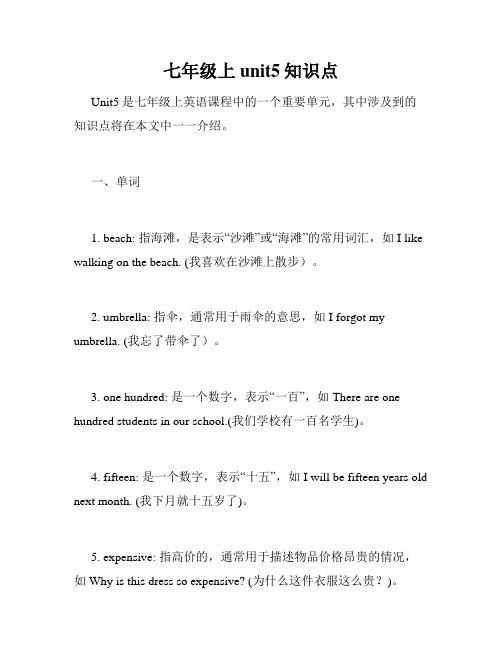
七年级上unit5知识点Unit5是七年级上英语课程中的一个重要单元,其中涉及到的知识点将在本文中一一介绍。
一、单词1. beach: 指海滩,是表示“沙滩”或“海滩”的常用词汇,如I like walking on the beach. (我喜欢在沙滩上散步)。
2. umbrella: 指伞,通常用于雨伞的意思,如I forgot my umbrella. (我忘了带伞了)。
3. one hundred: 是一个数字,表示“一百”,如There are one hundred students in our school.(我们学校有一百名学生)。
4. fifteen: 是一个数字,表示“十五”,如I will be fifteen years old next month. (我下月就十五岁了)。
5. expensive: 指高价的,通常用于描述物品价格昂贵的情况,如Why is this dress so expensive? (为什么这件衣服这么贵?)。
二、句型1. What does he/she look like?(他/她长什么样子?)这个句型通常用于询问某个人的外貌特征。
例如:What does your new teacher look like?(你们的新老师长什么样子?)回答时通常可以用一些形容词来描述这个人的外貌特征,如He has short black hair and big eyes.(他有短发,大眼睛)。
2. What's the weather like?(天气怎么样?)这个句型通常用于询问当前的天气情况。
例如:What's the weather like in Beijing?(北京的天气怎么样?)回答时通常可以使用一些形容词来描述天气状况,如It's sunny and hot.(天气晴朗,很热)。
3. How much is/are...?(多少钱?)这个句型通常用于询问某个物品的价格。
七年级英语上册 unit5单词专项讲解 课件 人教新目标版

Eg. Do you have a tennis ball?
Yes, I do
Do they have a soccer ball?
No, they don’t.
Does he have a racket?
Yes , she does.
We have some tennis rackets.
变否定句: We don’t have any tennis rackets. 变一般疑问句: Do you have any tennis rackets?
• Tim is interested in music.
7.difficult adjFra bibliotek困难的常用句型 It is difficult (for sb.) to do sth. “对某人来 说做某事是困难的”
Eg. The question is difficult to answer.
It is difficult for her to learn English.
play tennis
play soccer ball
球类前不加冠词,乐器前要加the
play the guitar
3. well
interj. Very well !
adv. 修饰动词
Eg. She speaks English well.
I can use the computer very well.
8. Watch 强调观看比赛,电视等,以较大的注意力观看 See 强调 看到的结果, look 表示有意识到观看,强调 看到动作 Eg. I see two birds Please look at the board.
Grammer focus Do you have…..? 你有….吗? do 为助动词,本身无意义,与have构成一般疑问 句。 如果主语是第三人称单数,则用does提问, 其 肯 定回答是:Yes,主语+do/does 否定回答是:No,主语+don’t/doesn’t *使用do 或 does 时,原句中谓语用动词原 形。
人教版本新目标中学初一上册的英语unit5学习知识点学习

人教版新目标初一上册英语unit5知识点Unit5Doyouhaveasoccerball?词汇:1.tennis球类名词小结soccerball 英式足球网球volleyball 排球basketballping-pongball篮球乒乓球2.“球拍”的表达tennisrack et网球拍ping-pongbat乒乓球拍3.play+名词构造的短语playsportsplaycomputergames玩电脑游戏参加体育运动4.“play+球类名词”构造的短语playping-pongballplaytennis 打网球playsoccer 踢足球playvolleyball打乒乓球打排球运动俱乐部名lastname=familyname 姓看电视onTV在电视上,经过电视常用的描绘某物或某事的形容词:interesting风趣的fun有趣的relaxing 轻松的boring无聊的difficult 困难的有大批的体育珍藏品每日句型:DoyouhaveaTV?Yes,Ido/No,Idon’t.Dotheyhaveacomputer?Yes,theydo./No,theydon ’t.Doeshehaveatennisracket?Yes,hedoes./No,hedoesn ’t. Doesshehaveasoccerball?Yes,shedoes./No,shedoesn ’t. Doeshehaveaping-pangball?Yes,hedoes./No,hedoesn ’t.Let’splaysoccer.Letmehelpyou.Idon’thaveasoccerball.Thatsoundsgood.法:1,句中不含be(am,is,are)的一般疑句的法。
也就是句中是,要一般疑句,在句首加do/does(当主是第三人称数的候用does),第一人称第二人称,原形其余的序不。
Ihaveacomputer.–Doesshelikeplayingping-pang.一定回答用yes,主+do/does.否认回答用No,主+don’t/doesn’t.一般句子中当主是第三人称数的候,要起化。
【精品】人教版新目标英语初一上册unit5

Unit 5 Do you have a soccer ball?一、知识概述本单元需要学习和掌握以下几个方面的知识:1.掌握本单元出现的生单词、词组和句型。
2.学习和掌握一部分描述事物性质的形容词。
3.学会用“have”对物品的所属进行提问与回答。
4.进一步复习和巩固连词and, but和or的区别和用法。
5.学会用“Let's...”提建议。
二、语音知识:音标三、单元重难点讲述1.—Do you have a ping-pong bat?你有乒乓球拍吗?—Yes, I do. 是的,我有。
—Do you have a ping-pong ball?你有乒乓球吗?—No, I don't. 不,我没有。
※动词have的用法:(1)have v.有(用于第一、二人称和第三人称复数)e.g.I have a new book.我有一本新书。
They have many interesting books.他们有许多有趣的书。
(2)have用于第三人称单数时应该用has。
e.g.Jim has a volleyball.吉姆有一个排球。
Rose h as a tennis racket.露丝有一个网球拍。
(3)询问别人“有……吗?”要借助于助动词“do”来构成一般疑问句。
“?”句型。
肯定回答用“Yes”,否定回答用“No”。
e.g.-Do you have a bike?你有自行车吗?-Yes, I do. / No, I don't.有。
/ 没有。
-Do they have a basketball?他们有篮球吗?-Yes, they do. / No, they don't.有。
/没有。
对单数第三人称提问时则应用助动词“does”,此时其后的动词“has”就应还原成“have”。
e.g.-Does she h ave a soccer ball?她有足球吗?-Yes, she does. / No, she doesn't.是的,她有。
人教版新目标初一上册英语第五单元知识点精讲
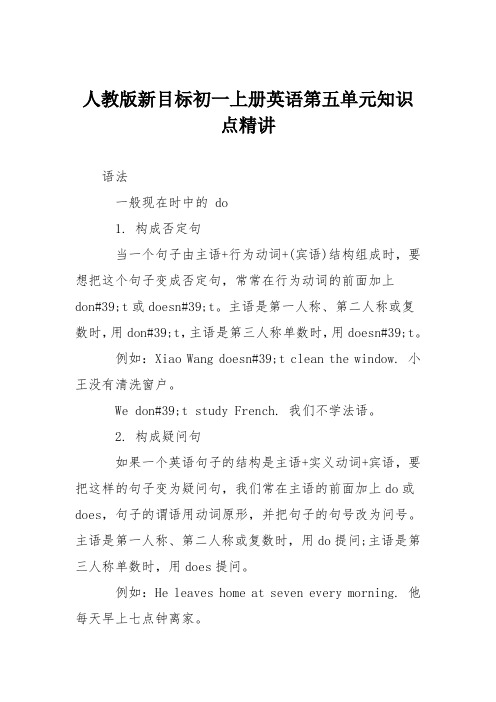
人教版新目标初一上册英语第五单元知识点精讲语法一般现在时中的 do1. 构成否定句当一个句子由主语+行为动词+(宾语)结构组成时,要想把这个句子变成否定句,常常在行为动词的前面加上don#39;t或doesn#39;t。
主语是第一人称、第二人称或复数时,用don#39;t,主语是第三人称单数时,用doesn#39;t。
例如:Xiao Wang doesn#39;t clean the window. 小王没有清洗窗户。
We don#39;t study French. 我们不学法语。
2. 构成疑问句如果一个英语句子的结构是主语+实义动词+宾语,要把这样的句子变为疑问句,我们常在主语的前面加上do或does,句子的谓语用动词原形,并把句子的句号改为问号。
主语是第一人称、第二人称或复数时,用do提问;主语是第三人称单数时,用does提问。
例如:He leaves home at seven every morning. 他每天早上七点钟离家。
Does he leave home at seven every morning? 他每天早上七点钟离家吗?They work on the farm. 他们在农场工作。
(对划线部分提问)Where do they work? 他们哪里工作?3. 用来构成附加问句附加问句放在陈述句之后,提出疑问,希望对方来证实。
附加问句的主语是代词。
如果前面是肯定句,附加问句就用否定形式;如果前面是否定句,附加问句就用肯定形式。
主语是第一或第二人称和复数时,用do;主语是第三人称时,用does。
例如:She doesn#39;t work here, does she? 她不在这里工作,是吗?You live in London, don#39;t you? 你住在伦敦,是吗?以上就是为大家整理的人教版新目标初一上册英语第五单元知识点精讲,大家还满意吗?希望对大家有所帮助!。
- 1、下载文档前请自行甄别文档内容的完整性,平台不提供额外的编辑、内容补充、找答案等附加服务。
- 2、"仅部分预览"的文档,不可在线预览部分如存在完整性等问题,可反馈申请退款(可完整预览的文档不适用该条件!)。
- 3、如文档侵犯您的权益,请联系客服反馈,我们会尽快为您处理(人工客服工作时间:9:00-18:30)。
Unit 5 Do you have a soccer ball? 要点精编1.do 助动词单三形式does实义动词做do homework = do the homeworkI do my homework. He does his homework.2.have v. 有单三形式hasI have a soccer ball. 区分soccer及soccer ballsoccer 是足球运动play soccer (球类运动前不加the)soccer ball 是足球本身football 既是运动又是球soccer player = football player 复数?Do you have a soccer ball? Yes, I do. No, I don’t.绝不能说Yes, I have. No, I haven’t.He has a watch.Does he have a watch?助动词+ 动词原形练习:You have new books. You don’t have new books.Do you have new book? Yes, I do. No, I don’t.绝不能用haveHe has a dictionary. He have a dictionary.动词原形No, he doesn’t.×I has a book. √I have a book.You do your homework. You don’t do your homework.Do you do your homework? Yes, I do. No, I don’t.He does his homework. He doesn’t do his homework.Does he do his homework? Yes, he does. No, he doesn’t.3. tennis n. 网球运动play tennis I like tennis. I don't like tennis.table tennis =ping –pong 乒乓球4. ball c. ballssome balls some 可数名词复数不可数名词many + 可数名词复数 many ballsmuch + 不可数名词 much watera lot of = lots of 可数名词复数不可数名词He has a lot of / lots of tennis balls× He doesn ’t have a lot of tennis balls.5.ping-pongplay ping-pong a ping-pong playerping-pong ball ping-pong bat × ping-pong ball bat Do you have a ping-pong bat? Yes, I do.6.bat 拍球7.volleyball 排球 My volleyball is under the white model plane.8.basketball 篮球9.baseball 棒球 baseball batHe has a baseball, but he doesn ’t have a baseball bat.10.hey 嘿 熟人间打招呼用语11.let 让,允许 后接动词原形 Let sb doLet sb not doLet us go! Let us not go!Let ’sLet him ask a question. Let him not ask a question.12.go 去 goes do -does have -hasgo to school / university go home go therego -come go there / come herego to bed make the bed13.we 我们 宾us our oursWe go to school. te adj. adv. 晚 反义词 earlyWe ’re late.be late for sthI’m late for school. He is late for the meeting.15.hasHe has a volleyball. Does he have a volleyball.只用于肯定句 不用于否定句和疑问句Yes, he does. No, he doesn’t.16.get 取,得到getsGo and get a cup of tea. 去拿一杯茶Let me get it. 让我拿它get a letter / a ticketget up 起床I get up late this morning.17.great adj. 伟大的、美妙的China is a great country.I’ll help you. Great. That’s great. It’s great.18.play plays 单三player 选手播放器play a game play computer gamesplay baseball play chess play the piano19.sound v. 听起来系动词Let’s play basketball. That sounds good.(great)It sounds good.Sounds good.sound + 形容词sound like + n. / 名词短语It sounds like a good idea.ThatSounds20. interesting adj. 有趣的(表示事物的特征)an interesting manThat’s an interesting story.That sounds interesting.That sounds like an interesting story.interested adj. 对…感兴趣(表示人的内心活动)be interested in = take an interest in 对…感兴趣I’m interested in playing computer games.I take an interest in playing computer games.=>I’m interested in the interesting story.I take an interest in the interesting story.boring 令人感到无聊的事物的特征bored 无聊的人的内心活动a boring football game / filmLet’s play computer games. That sounds boring.I feel bored. = I’m bored.对…感到无聊be bored with sthI’m bored with the boring story.21.fun adj. / u. 有趣的、乐趣fun 逗乐interesting 吸引人Let’s play basketball. That sounds fun.like funa fun gameIt’s fun to do sth. 做某事很有趣It’s fun to watch TV.have fun doingI have fun watching TV.22.difficult 困难的easya difficult question / testVolleyball is difficult.It’s difficult (for sb) to do sth.It’s difficult for me to play volleyball.区别different23.relaxing 轻松的、放松的(事物的特征)a relaxing evening some relaxing musicrelaxed I’m relaxed. I feel relaxed, this morning.be relaxed about sth 对某事很放松Don’t worry. We’re relaxed about time.24.watch v. 注视、观看watches 单三watch TV / a game / a movieLet’s watch TV.watch是指目不转睛地看see是指看到的结果例:I can see some apples on the tree.Look 看的动作不及物向…看Look at the blackboard.TV 电视=television c. TVs (注意大写)I go home to watch TV.He watches a football game on TV. 他在电视上看足球比赛25.same adj. 相同的前必加thethe same school the same computerWe go to the same school.反义词different 前无theWe go to different schools.26.different adj. difference[c]a different ideaThere are many differences between us.27.love v. 爱单三lovesMy parents love me. ×very love / like28.with 介词和We play soccer at school with our friends.We and our friends play soccer at school.He with his parents watches TV every night.His parents with him watch TV every night.He and his parents watch TV every night.This / that / these / those /each / every / some next / last 后接时间状语前不用介词He watches TV with his parents every night.29.sport n. [c] 体育运动常用复数play sports. = do sports. = have sports.做运动a sports meeting 联想 a clothes / clothing storeI love sports, but I don’t play them.区别:What’s on the table?30.them 主格they 宾格them their theirs 不与冠词联用I play sports with them.Where are they? 不是Where are them.31.only adv. 只,仅位于助动词、系动词、情态动词之后,实义动词之前I’m only a student.I only watch TV on Sundays.32.like v. 喜欢、喜爱likes 单三He likes milk and hamburgers.He doesn’在否定句中表连接,用orDoes he like milk and hamburgers? Yes, he does. No, he doesn’t.like to do 短暂的,非习惯性的喜欢doing 长期的,习惯性喜欢I like watching sports on TV, but today, I like to listen to them on the radio.He doesn't like doing sports.would like + n.+ to doI would like some bananas. I would like to eat some bananas.Would you like some bananas? Would you like to eat some bananas?feel like + n.doingI feel like some bananas. I feel like eating some bananas.33.easy adj. 容易的反difficult / hardan easy job / examIt’s easy (for sb) to do sth. 联想difficultIt’s easy for me to play computer games.It’s easy for them to play sports very well.It’s easy for me. 那对我来说很容易34.after 介、连在…以后after school 放学以后,after class 下课之后after 5 o’clockShe has dinner after she does homework.after doing homework.35.class n. 班级、课班级I’m in Class Five Grade Two.class 同学们Good morning, class. My class are all here.班级Our class is very bigin class 在课堂上(无the)in the classroom 在教室里Don’t talk in class / in the classroom.课class 授课形式 c. lesson 授课内容 c.I like English classes.Let’s learn Lesson Six.classmate 同班同学[c] classmatesAfter class, I play ping-pong with my classmates. This is my classmate Lucy.。
